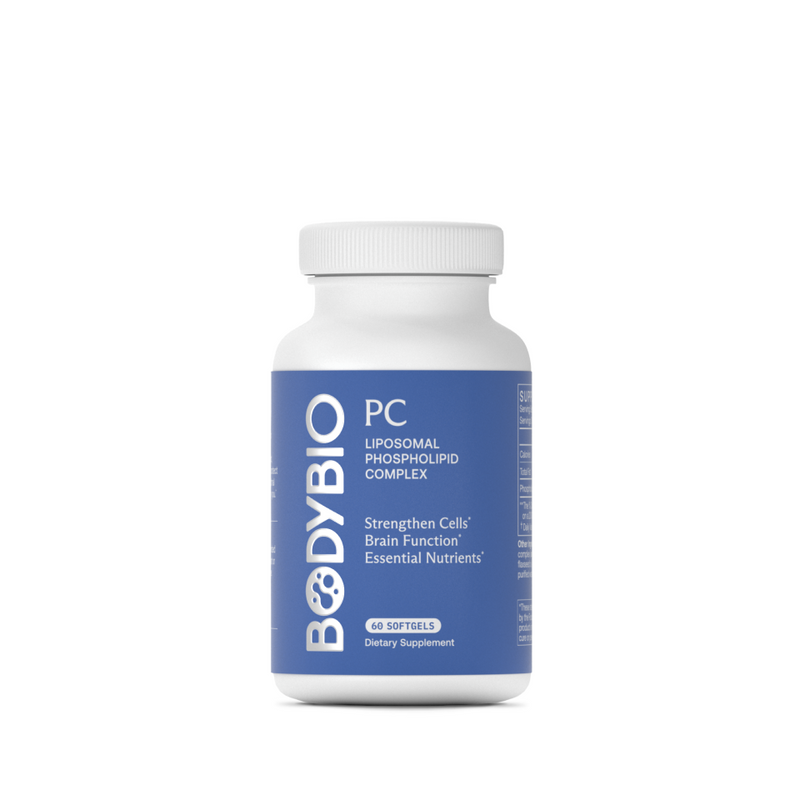PCOS as a Metabolic Disorder: How Cellular Health and Healthy Fats Support Hormonal Balance
Authors:

Ashley Palmer
Nutritional Therapy Practitioner, Health & Wellness Expert
Key Takeaways:
You're sitting in another doctor's office, hearing the same old advice about PCOS. "Lose weight, go on birth control, maybe try metformin." You nod politely, but inside you're thinking, "There has to be more..." And you're absolutely right.
What if everything you've been told about PCOS is only scratching the surface? What if those irregular periods, stubborn weight gain, and energy crashes aren't just "hormonal issues" but actually signs that something deeper is going on, right down to your cells?
The truth is that PCOS isn't just a hormonal condition. It's fundamentally a metabolic disorder rooted in how your cells function, communicate, and produce energy. And once you understand this, everything changes, including how you approach healing.
We're going to explore how PCOS actually starts with disrupted cellular communication and damaged mitochondria, and why the right healthy fats might be key to helping your cells heal from the inside out.
Table of Contents:
-
What Is PCOS?
-
Why PCOS Is Really a Metabolic Issue
-
What's Actually Happening Inside Your Cells
-
How Mitochondrial Dysfunction Drives PCOS Symptoms
-
How Healthy Fats Support Cellular Repair in PCOS
-
Simple Steps That Support Real Healing
-
Supporting PCOS Recovery Through Cellular Health
What Is PCOS?
Polycystic ovary syndrome, or PCOS, affects somewhere between 5-20% of women of reproductive age, making it one of the most common hormonal conditions women face today. Yet despite how prevalent it is, many women struggle for years to get a clear diagnosis, often visiting multiple doctors and feeling dismissed or misunderstood.
PCOS gets its name from the appearance of the ovaries on ultrasound, which often show multiple small cysts (though not all women with PCOS have these). But the condition is much more complex than just ovarian cysts.
The Traditional PCOS Diagnosis
Doctors typically diagnose PCOS using what's called the Rotterdam criteria. This diagnostic framework requires at least two of these three symptoms:
-
Irregular or absent periods: This might mean cycles longer than 35 days, fewer than 8 periods per year, or periods that are unpredictable in timing and flow.
-
Signs of excess androgens: This can show up as acne, excess hair growth on the face or body (hirsutism), male-pattern hair loss, or elevated testosterone levels in blood tests.
-
Polycystic ovarian morphology: Multiple small follicles visible on an ovarian ultrasound, giving the ovaries a "string of pearls" appearance.
The Symptoms Women Actually Experience
Beyond the official diagnostic criteria, women with PCOS often deal with symptoms that significantly impact daily life: weight gain or difficulty losing weight, intense sugar and carb cravings, persistent fatigue, brain fog, mood swings, skin issues, sleep problems, and fertility challenges when trying to conceive.
What's frustrating is that these symptoms often develop gradually and can be dismissed as "normal" parts of being busy or stressed.
Why PCOS Is Really a Metabolic Issue
Conventional, Western medicine typically approaches PCOS as a reproductive disorder with some metabolic side effects. Birth control is often prescribed to regulate cycles, metformin for insulin resistance, and spironolactone for excess hair growth. While these treatments can help manage symptoms, they don't address why PCOS develops in the first place.
This is where the cellular health perspective becomes so important. When we understand PCOS as fundamentally a metabolic condition that affects cellular function, we can start to address the root causes rather than just manage the symptoms.
A key cellular marker of PCOS is elevated leptin. Studies have found that substantially elevated serum leptin is significantly associated with PCOS, and this isn't just a random association. Leptin is supposed to help your body understand when you have enough energy stored away. But when leptin signaling gets disrupted, your body essentially becomes deaf to its own fullness cues.
This creates a domino effect:
-
Your appetite regulation goes haywire
-
Energy storage becomes inefficient
-
Reproductive hormones get confused
-
Weight management becomes increasingly difficult
What's Actually Happening Inside Your Cells
Let’s keep diving into the cellular biology of PCOS. To really understand PCOS, we need to look at what's happening at the cellular level. Your cells contain mitochondria that produce energy and cell membranes that control what gets in and out. When these cellular components aren't functioning properly, your whole body feels it.
When Cellular Communication Breaks Down
Research reveals that hyperandrogenism and sympathetic overactivation disrupt hypothalamic-adipose signaling, ultimately contributing to PCOS pathophysiology. Simply put: the conversation between your brain and your fat cells gets seriously scrambled.
When your brain can't properly "hear" what your fat cells are saying about energy storage, it makes poor decisions about:
-
How much food you need
-
Where to store incoming calories
-
When to release stored energy
-
How to regulate reproductive hormones
This broken game of telephone between your cells explains why traditional "eat less, move more" advice often falls flat for women with PCOS. You're not fighting against willpower; you're fighting against confused cellular communication.
The Cell Membrane Connection
Your cell membranes are like the gatekeepers of cellular health, controlling what gets in and what stays out. These phospholipid-rich barriers are crucial for proper cellular function, but they're often overlooked in PCOS treatment.
When cell membranes become rigid (lose their ability to let nutrients through) or damaged:
-
Nutrients struggle to get into cells where they're needed
-
Hormonal signals get distorted or blocked entirely
-
Cellular waste builds up like traffic in a tunnel
-
Energy production becomes sluggish and inefficient
How Mitochondrial Dysfunction Drives PCOS Symptoms
Mitochondrial dysfunction, increased oxidative stress, and disrupted glucose metabolism (blood sugar dysregulation) are frequently observed in individuals with PCOS. Several factors in PCOS, including androgen excess and insulin resistance, collectively enhance oxidative stress, which subsequently leads to mitochondrial dysfunction. This creates a vicious cycle where damaged mitochondria produce more oxidative stress, which damages mitochondria even further.
When your mitochondria malfunction, you experience persistent fatigue that sleep doesn't fix, brain fog that makes simple tasks overwhelming, sluggish metabolism that makes weight management difficult, and mood swings as your brain struggles with inconsistent energy supply.
Studies show that significantly higher levels of oxidative stress markers and abnormal mitochondrial function have been found in patients with PCOS compared to healthy subjects. This isn't just about loading up on antioxidants—the real solution involves rebuilding the cellular infrastructure that supports optimal function.
How Healthy Fats Support Cellular Repair in PCOS
While PCOS has complex cellular roots, there are powerful nutritional tools to support healing. The key lies in understanding which nutrients actually reach and repair your cells, and healthy fats are absolutely central to this process.
Essential Fatty Acids: Your Cellular Repair Crew
A study of women with PCOS and healthy controls showed that women in the highest tertile of serum phospholipid omega-3 fatty acids were 40% less likely to have PCOS compared to those in the lowest tertile. This isn't just a correlation, these fats are actively involved in cellular repair and function.
Omega-3 fatty acids may work their magic by:
-
Cooling down inflammation at the cellular level
-
Supporting the production of hormones and signaling molecules
-
Improving how cells respond to insulin and other hormones
-
Helping repair damaged cell membranes
The source of your healthy fats matters. Omega-6 fats from processed seed oils are oxidized and inflammatory, but the same fats from whole foods or high-quality supplements actually support cellular health.*
Phospholipids: The Cellular Rebuilding Blocks
While everyone talks about omega-3s, phospholipids often fly under the radar, but they shouldn't. Phospholipids are the building blocks of cell membranes, and when your cellular walls are strong yet flexible, everything else works better.
Phospholipids (including phosphatidylcholine, phostphatidylserine and others) may help by:
-
Rebuilding damaged cell membrane structure*
-
Supporting cellular communication pathways*
-
Supporting mitochondrial function and energy production*
-
Supporting the body's natural detoxification processes*
Simple Steps That Support Real Healing
If PCOS really does stem from cellular dysfunction, then supporting your cellular health becomes a priority. Instead of only focusing on symptoms, you can address what might be driving them in the first place.
Prioritize Cellular Nutrition
The foods you eat directly impact your cellular health, so choosing nutrient-dense options becomes especially important when you're dealing with PCOS. Egg yolks, organ meats, wild-caught fish, and high-quality dairy and soy provide phospholipids that serve as building blocks for your cell membranes. These foods help rebuild the cellular infrastructure that supports optimal function.
Anti-inflammatory fats from wild-caught fatty fish, avocados, olives, and nuts provide essential fatty acids that may help cool cellular inflammation while supporting hormone production. Rather than following restrictive diets that can stress your system further, focus on balanced meals with protein, healthy fats, and complex carbohydrates. This approach helps stabilize blood sugar and reduces the oxidative stress burden on already-compromised mitochondria.
Many women with PCOS also struggle with mineral deficiencies that directly impact cellular function. Magnesium supports mitochondrial energy production and helps regulate insulin sensitivity. Zinc is essential for hormone production and cellular repair processes. Chromium helps improve how cells respond to insulin. These mineral deficiencies are particularly common in PCOS and can worsen the cellular dysfunction that drives symptoms.
Support Mitochondrial Health
Quality sleep is crucial for leptin signaling and mitochondrial repair. Aim for 7-9 hours of consistent, restorative sleep each night. When it comes to movement, exercise stimulates the creation of new mitochondria, but overdoing it can create more oxidative stress. Focus on strength training, walking, and activities you genuinely enjoy rather than punishing workout routines.
Chronic stress compounds existing cellular dysfunction, so finding stress management techniques that work for you becomes essential. Whether that's meditation, time in nature, or connecting with supportive people, managing your stress response helps protect your cellular health.
Supporting PCOS Recovery Through Cellular Health
PCOS isn't just a hormone problem; it's a cellular health issue that requires addressing the underlying dysfunction rather than just managing symptoms. When you support your cells with the right nutrition, proper sleep, and stress management, you're giving your body the tools to restore balance naturally.
BodyBio PC and Balance Oil help provide the foundational building blocks your cells need to rebuild membranes, support metabolism, and promote hormone balance.*


